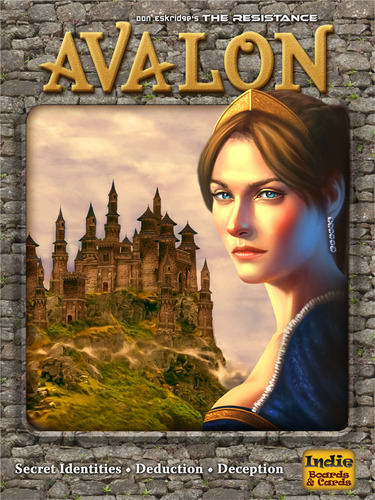Released in 2013, Avalon is a social deduction board game and the more popular Merlin-branded reskin of its lesser known predecessor: The Resistance. The game supports 5-10 players and as with most social deduction games, 5 players is the bare minimum to establish the type of dynamic required while 10 players quickly becomes a chaotic mess of loud voices. A number right in between such as 7 or 8 ultimately works best, with the game dividing the group of players into two sides: the majority belonging to “good” and the minority becoming “evil”. It’s the object of either side to then pass (or fail, in the case of evil) 3 out of the 5 missions, which are a rotating selection of a few players voted on by the group to do each mission. The missions themselves are a simple anonymous vote of mission-goers, who, as evil, can choose to pass or fail a mission while good may only pass a mission, with just one fail vote being enough to fail the mission. This simple set of missions and voting rounds out all the base mechanics for each player, in what is quite simple to pick up on the spot.
Where Avalon often becomes confusing for the new player is instead often in the roles and layers of varying levels of information that each player has. Between Merlin, Percival, Morgana, and the Assassin, the core four roles already add a lot to the dynamics of the game, with Mordred and Oberon serving as additional balancing roles for experienced groups. But after the first time playing, I have found most players are both confused and excited for another game and by the third time they have learned all the roles and their effects.
For this play session, I played Avalon, with a full group of experienced players, and what stood out by the end is how long the game lasts. With no limit on how long players can debate over the optimal team, the game easily takes 45-75 minutes per game, but while in the moment, this time goes by very quickly. After the initial roles and information are revealed in order to set up the game, the first mission is selected with little hesitance and a rather nonchalant air. But quickly, this vanishes after the results are revealed, in either the second or third mission the table becomes filled with polarized players, accusing one or another and trying to sway the general opinion. What often makes or breaks a winning good side lies in the Loyal Servants of Arthur, the good members with no information who must see through the deceptions of Morgana and her evil and instead pick up on the lead of the Percival on their team. Of course, it’s these same members who are left the most confused, paranoid, and mistrusting–and in fact quite outspoken and vocal as well. Additionally, playing as the other roles led to a variety of different experiences: as Percival, it feels like a detective who, once cracking the case and determining Merlin from Morgana, is triumphant and assertive. Morgana is the most duplicitous of the evil, trying her hardest to fool Percival while the other evil and Merlin are the ones aware of information and take a more contemplative and reserved role. All told, being a social game by nature and with the addition of so many different roles and dynamics, Avalon is a game with great replayability, approachable for a wide variety of people, and a chaotic, head-twisting experience.
